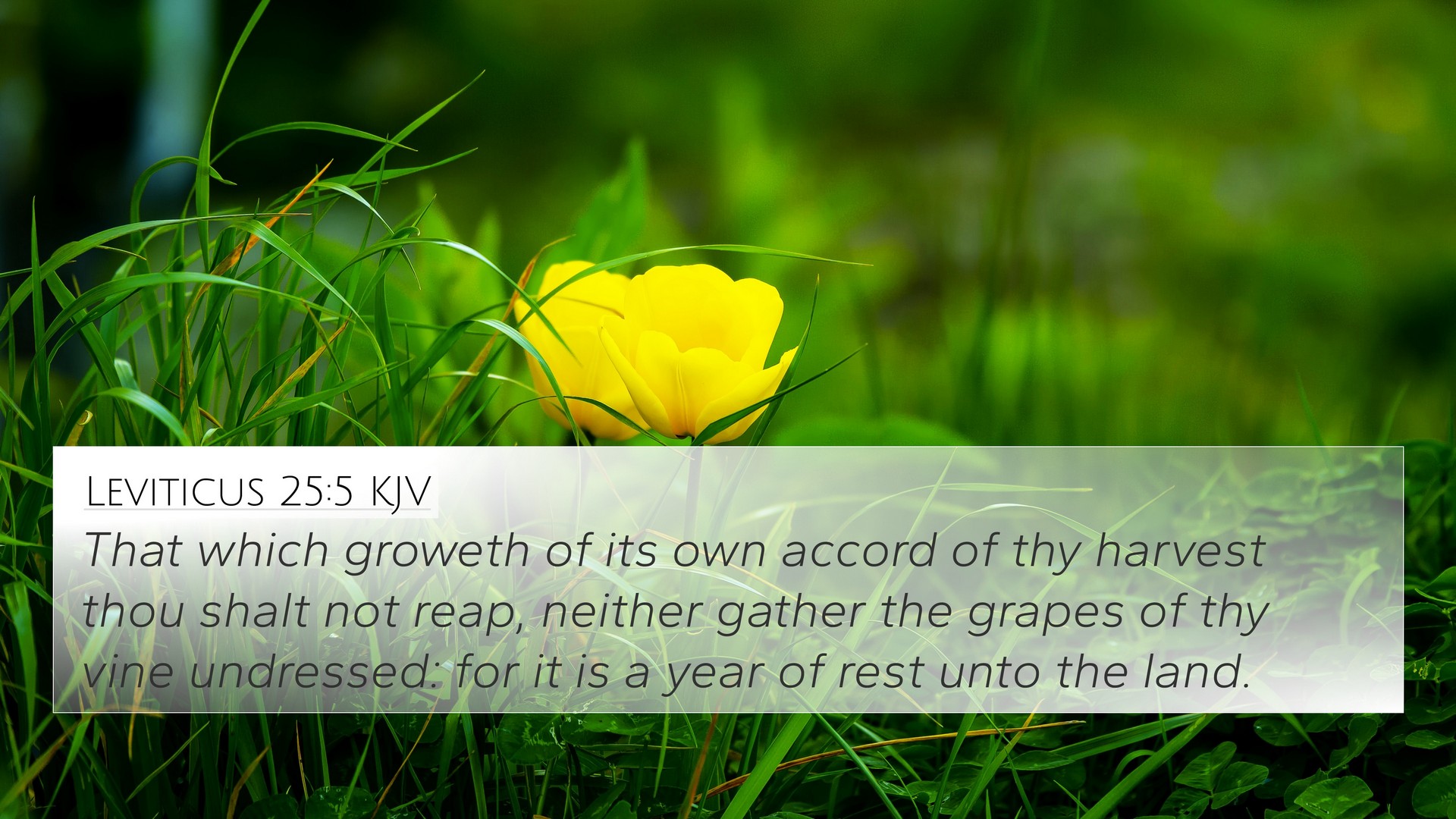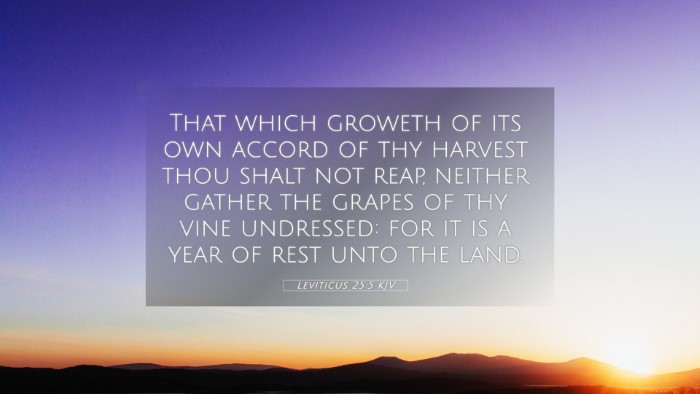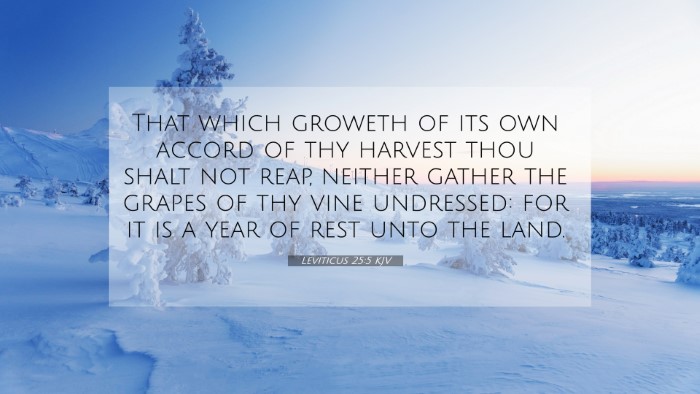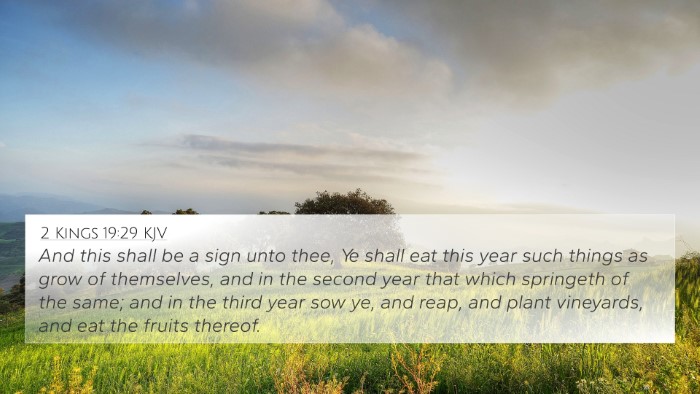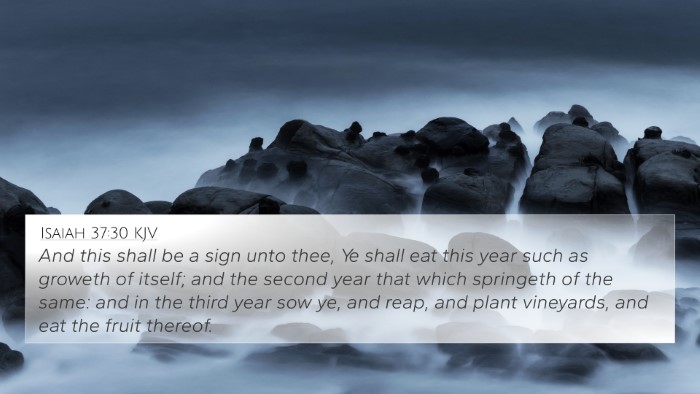Understanding Leviticus 25:5
Leviticus 25:5 states: "That which groweth of its own accord of thy harvest thou shalt not reap, neither gather the grapes of thy vine undressed: for it is a year of rest unto the land."
Summary of Meaning
This verse is part of the laws concerning the sabbatical year, a time set apart for the rest of the land. It emphasizes the need for rest not only for the people but also for the land itself. The agricultural practices prescribed are aimed at ensuring the sustainability of the environment while fostering a deeper reliance on God’s provision.
Insights from Public Domain Commentaries
Matthew Henry's Commentary
Matthew Henry interprets this passage as an expression of God's care for the earth and His people. The sabbath year symbolizes a time for regeneration. It teaches us to trust in God's provision without the anxiety of laboring continually for our needs. This principle fosters a deeper relationship with God, as the Israelites were to rely on His goodness during this period of rest.
Albert Barnes' Notes
Albert Barnes associates the concept of letting fields lie fallow with God’s design for both humanity and nature. He notes that this practice not only benefits the land but also encourages a communal spirit of generosity, allowing the poor and the beasts of the field to eat from what grows naturally. This emphasizes social justice and the care of the marginalized within the community.
Adam Clarke's Commentary
Adam Clarke views this command as a reminder of the divine order that governs creation. He draws attention to the idea that while humans work diligently, they must also acknowledge the limits of their control over nature. Clarke further explains that this cycle of rest would ultimately restore the land's fertility and highlight God's sovereignty over agricultural production.
Bible Cross-References
- Exodus 23:10-11 - Discusses the practice of allowing the land to rest every seventh year.
- Deuteronomy 15:1-2 - Details the year of release, where debts are forgiven and the poor are honored.
- Isaiah 32:15 - Connects the themes of rest and spiritual renewal to the work of the Spirit.
- 2 Chronicles 36:21 - Mentions the fulfillment of the sabbatical years in Israel's history, showing the consequences of neglecting it.
- Leviticus 26:34-35 - Reiterates the necessity of observing the sabbatical years for the land to receive its rest.
- Hebrews 4:9-10 - Discusses the spiritual rest that remains for God’s people, paralleling the physical rest of the land.
- Luke 12:24 - Explores the idea that God cares for His creation and will provide for our needs.
Connections with Other Scriptures
This verse and its surrounding context create rich thematic connections with various other passages in the Bible. Such connections offer insights into God's provisions and our responsibilities as stewards of His creation.
Thematic Bible Verse Connections
- Sabbath Observance: Exodus 20:8-11 also provides instruction on keeping the sabbath holy, linking the need for physical and spiritual rest.
- God’s Provision: Philippians 4:19 reinforces the assurance that God will provide for all needs, which can apply during the rest offered every seventh year.
- Stewardship: Genesis 1:28 commands humans to steward creation, which is echoed in the practices outlined in Leviticus.
Purpose and Application
The teachings derived from Leviticus 25:5 transcend the mere agricultural practice and extend into moral and spiritual applications for believers today. The call to rest and reliance on God invites introspection and practices that acknowledge divine sovereignty and care.
Tools for Interpreting Biblical Principles
Using a Bible concordance and Bible cross-reference guide can aid in uncovering more connections between verses that relate to the themes of rest, stewardship, and divine provision. These tools are invaluable for studying patterns in God's word and the cohesive narratives that exist throughout the scriptures.
Conclusion
In summary, Leviticus 25:5 serves as a powerful reminder of the importance of rest, both for the land and in our spiritual lives. The insights from esteemed commentaries and the connections to other Bible verses create a rich tapestry of understanding, promoting not only agricultural wisdom but also a holistic view of how God interacts with His creation.
As we engage in Bible cross-referencing, let us seek to uncover and appreciate the layers of meaning found in each verse, leading us to a deeper understanding of God’s enduring truths.
